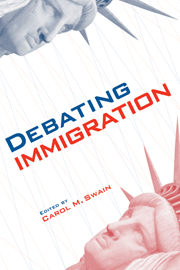Book contents
- Frontmatter
- Contents
- About the Contributors
- Preface
- Acknowledgments
- 1 Introduction
- PART I PHILOSOPHY AND RELIGION
- PART II LAW AND POLICY
- PART III ECONOMICS AND DEMOGRAPHICS
- PART IV RACE
- 13 The Congressional Black Caucus and the Impact of Immigration on African American Unemployment
- 14 Hispanic and Asian Immigrants
- 15 Strange Bedfellows, Unintended Consequences, and the Curious Contours of the Immigration Debate
- PART V COSMOPOLITANISM
- PART VI CONCLUSION
- Notes
- Index
14 - Hispanic and Asian Immigrants
America's Last Hope
Published online by Cambridge University Press: 05 June 2012
- Frontmatter
- Contents
- About the Contributors
- Preface
- Acknowledgments
- 1 Introduction
- PART I PHILOSOPHY AND RELIGION
- PART II LAW AND POLICY
- PART III ECONOMICS AND DEMOGRAPHICS
- PART IV RACE
- 13 The Congressional Black Caucus and the Impact of Immigration on African American Unemployment
- 14 Hispanic and Asian Immigrants
- 15 Strange Bedfellows, Unintended Consequences, and the Curious Contours of the Immigration Debate
- PART V COSMOPOLITANISM
- PART VI CONCLUSION
- Notes
- Index
Summary
INTRODUCTION
The claim that large waves of “nonwhite” immigration will have a significant effect on the American creed, identity, and society is not without foundation. Immigration waves have continually changed American society since its earliest days. However, these immigrants have made their mark not by undoing the established creed, thus leaving a normative vacuum and sowing societal dissent, but by recasting the framework that holds the United States together and often making it the better for it. This same process of societal reframing is occurring in the current stage of American history. A large number of immigrants, many from Mexico and other South American countries (and to a lesser extent from Asia), are making the United States more communitarian than it has been in recent decades by fostering a stronger commitment to family, community, and nation, as well as respect for authority and moderate religious-moral values. Like other immigrant groups, they have proved themselves to be industrious and achievement-oriented. Furthermore, by virtue of their young age, many of these immigrants will help to protect the United States from the demographic malaise that is diminishing European and Japanese populations. And, least noted but of much importance, these same immigrants are going to modify American society, changing a country often depicted as divided along immutable racial lines between whites and blacks – a society in which many of the latter continue to see themselves as victims – to an increasingly varied society in which more fluid ethnic groups will play a greater role and in which victimhood will play an ever-smaller role.
- Type
- Chapter
- Information
- Debating Immigration , pp. 189 - 205Publisher: Cambridge University PressPrint publication year: 2007
- 3
- Cited by



